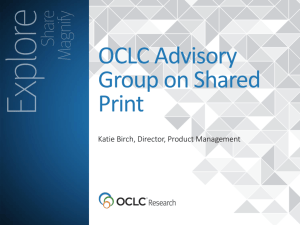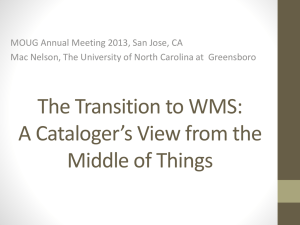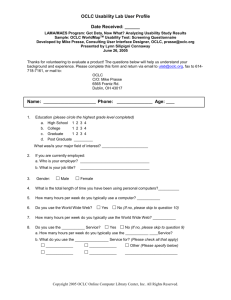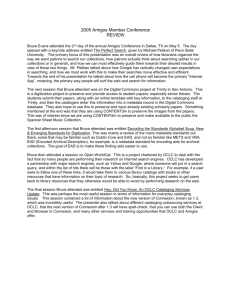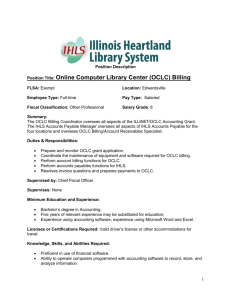Is Skyriver in the Future for Oregon State University Libraries? By Faye A. Chadwell, Michael Boock, Richard Sapon‐White and Ann Miller
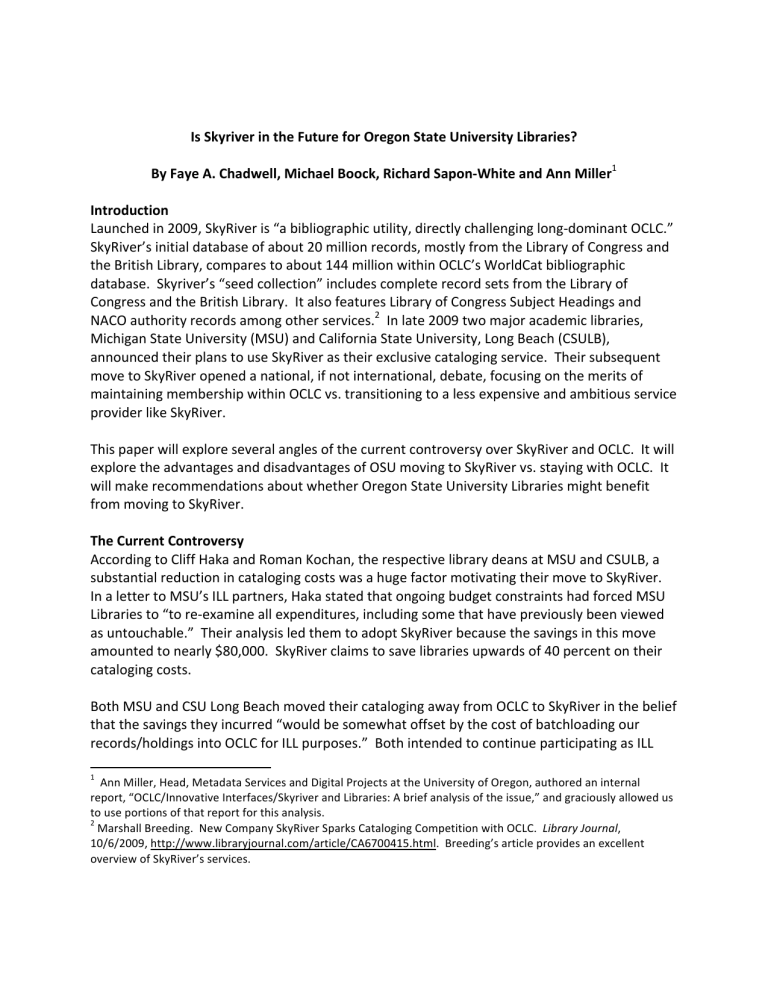
Is Skyriver in the Future for Oregon State University Libraries?
By Faye A. Chadwell, Michael Boock, Richard Sapon‐White and Ann Miller 1
Introduction
Launched in 2009, SkyRiver is “a bibliographic utility, directly challenging long‐dominant OCLC.”
SkyRiver’s initial database of about 20 million records, mostly from the Library of Congress and the British Library, compares to about 144 million within OCLC’s WorldCat bibliographic database. Skyriver’s “seed collection” includes complete record sets from the Library of
Congress and the British Library. It also features Library of Congress Subject Headings and
NACO authority records among other services.
2 In late 2009 two major academic libraries,
Michigan State University (MSU) and California State University, Long Beach (CSULB), announced their plans to use SkyRiver as their exclusive cataloging service. Their subsequent move to SkyRiver opened a national, if not international, debate, focusing on the merits of maintaining membership within OCLC vs. transitioning to a less expensive and ambitious service
provider like SkyRiver.
This paper will explore several angles of the current controversy over SkyRiver and OCLC. It will explore the advantages and disadvantages of OSU moving to SkyRiver vs. staying with OCLC. It will make recommendations about whether Oregon State University Libraries might benefit from moving to SkyRiver.
The Current Controversy
According to Cliff Haka and Roman Kochan, the respective library deans at MSU and CSULB, a substantial reduction in cataloging costs was a huge factor motivating their move to SkyRiver.
In a letter to MSU’s ILL partners, Haka stated that ongoing budget constraints had forced MSU
Libraries to “to re‐examine all expenditures, including some that have previously been viewed as untouchable.” Their analysis led them to adopt SkyRiver because the savings in this move amounted to nearly $80,000. SkyRiver claims to save libraries upwards of 40 percent on their
cataloging costs.
Both MSU and CSU Long Beach moved their cataloging away from OCLC to SkyRiver in the belief that the savings they incurred “would be somewhat offset by the cost of batchloading our records/holdings into OCLC for ILL purposes.” Both intended to continue participating as ILL
1 Ann Miller, Head, Metadata Services and Digital Projects at the University of Oregon, authored an internal report, “OCLC/Innovative Interfaces/Skyriver and Libraries: A brief analysis of the issue,” and graciously allowed us to use portions of that report for this analysis.
2 Marshall Breeding. New Company SkyRiver Sparks Cataloging Competition with OCLC. Library Journal ,
10/6/2009, http://www.libraryjournal.com/article/CA6700415.html. Breeding’s article provides an excellent
overview of SkyRiver’s services.
partners. However, despite OCLC’s price schedule for batch downloading having once listed the costs as $0.23 per record, OCLC later quoted MSU an amount that equaled about $2.85 per record. Much to their consternation and surprise, MSU concluded that this new per record costs would ultimately negate any savings they gained by moving to SkyRiver. At this time,
MSU Libraries have opted not to contribute their newer holdings to Worldcat while continuing to analyze what benefits they gain from purchasing services to SkyRiver.
3
In response to a perceived future with more libraries leaving the OCLC family, Larry Alford, dean of Temple University Libraries and chair of the OCLC Board of Trustees, (a position for which he receives compensation) notes that he understands why libraries in these economic times might elect “to take the cheaper or ‘lite cataloging or Z39.50 copy’ route to obtain cataloging records.” However, Alford contends that these same libraries put the library world at risk of
“losing WorldCat and Mr. Kilgour’s great idea.” 4 OCLC’s Vice President for the Americas and
Global VP of Marketing, Cathy De Rosa stated in a Library Journal interview that MSU’s request represented a call for OCLC to perform “data stewardship” duties for MSU’s records, in addition to the services provided by the resource‐sharing subscription. She maintained further, “That’s not the way the cost‐share model works today.” 5
Both library deans have stated publicly that the SkyRiver’s presence benefits libraries because it creates more competition and thus more choices in the library marketplace for bibliographic services.” Let it be noted that libraries have applied a similar argument or voiced analogous
concerns about competition in the library marketplace in multiple settings:
• arguing against Big Deals that bundled journals;
• making the case for more open access journal publishing to offset a historical pattern of high serial inflation rates;
• bemoaning the loss of choice when one book vendor purchases a competitor.
6
3 Josh Hadro. OCLC and Michigan State at Impasse Over SkyRiver Cataloging, Resource Sharing Costs. Library Jour‐ nal , February 26, 2010.
http://www.libraryjournal.com/index.asp?layout=talkbackCommentsFull&talk_back_header_id=6644809&articlei d=CA6720609
4 Larry Alford. The Value of the OCLC Cooperative.
http://www.oclc.org/us/en/multimedia/2010/files/arc/Larry_Alford_essay.pdf; these are from remarks that Alford
delivered at the OCLC Americas Regional Council Meeting, held January 15, 2010 in Boston, Massachusetts.
5
6
SkyRiver. Two Academic Libraries Announce SkyRiver Implementations, October 19, 2009
http://www.librarytechnology.org/ltg‐displaytext.pl?RC=14311. SkyRiver issued this press release which was posted on the Library Technology Guides website.
See these examples: http://www.arl.org/sparc/publications/papers/case_capitalizing_2002.shtml;
http://newsbreaks.infotoday.com/NewsBreaks/Baker‐‐Taylor‐Acquires‐Blackwell‐North‐America‐and‐James‐
BennettMarket‐Reaction‐60243.asp.
Libraries have also expressed concern when “marketplace” choices or competition threatened the future of traditional or core library services. For example, Hawaii’s ill‐fated outsourcing contract with Baker and Taylor in the mid‐1990s stirred tremendous controversy. Ironically, however, in its opposition to outsourcing, the report from ALA’s appointed task force “seemed to accept the outsourcing of core services‐‐such as cooperative cataloging or consortial collection management‐‐to not‐for‐profit agencies run by and for librarians, because ‘the nature of the work remains in‐house‐‐‐ loosely associated with and accountable to the libraries which benefit from the outsourced services.’" 7
It is not clear at this time whether Skyriver presents a threat to the OCLC database or to OCLC as a non‐profit membership organization. Skyriver’s database is perhaps too small and, as yet, too limited in scope to provide such competition, especially for larger libraries. Skyriver, for its part, also claims that the product is transparent and easy to use and the bibliographic records come with no reuse policies attached, though its sister corporation, Innovative Interfaces (III), is notoriously secretive and closed to adapting the integrated library system without assessing additional cost.
Adding fuel to the fire of this controversy is the ongoing turf battle between OCLC and III. III found OCLC emerging as a competitor in the regional lending management market in 2008 with
Worldcat Navigator. Then in the spring of 2009 III found OCLC in the integrated library system marketplace when OCLC’s proposed a web‐scale ILS based on the Worldcat database. OCLC, in its turn, found III promoting Encore as an alternative to Worldcat Local in 2008.
Several voices have been calling for OCLC to examine its business model with an eye toward decoupling its cataloging services from its resource sharing enterprise. Such a shift could probably accommodate libraries like MSU and possibly create new revenue streams to replace the displaced profits.
8 Even Larry Alford’s letter proposes the need “to be reasonable and rational in response to the changing environment” and the need “to be inclusive in terms of access and membership in order to support the information needs of all users and OCLC’s public purpose of increasing access to information.” 9 Another ironical fear seems to be: should
OCLC not find some way to adapt, it will further establish itself an entity that is forcing
7 Norman Oder and Michael Rogers. ALA Reaffirms Library Values, Library Journal , February 15 1999, http://web.ebscohost.com/ehost/detail?vid=3&hid=5&sid=c0e9d59a‐c4cf‐4b38‐8814‐ ea4547451ab3%40sessionmgr11&bdata=JmxvZ2lucGFnZT1Mb2dpbi5hc3Amc2l0ZT1laG9zdC1saXZl#db=lxh&AN=1
538419.
8 Jonathan Rochkind has blogged about these possibilities in a couple of postings. See: http://bibwild.wordpress.com/?s=decoupling&searchbutton=go !; http://bibwild.wordpress.com/?s=skyriver&searchbutton=go !
; See also: Barbara Fister. OCLC’s Uncommon Di‐ lemma, http://www.libraryjournal.com/article/CA6723305.html
.
9 Larry Alford.
http://www.oclc.org/us/en/multimedia/2010/files/arc/Larry_Alford_essay.pdf
.
members to lock into a scenario that is not dissimilar from what libraries have experienced with other types of service vendors and publishers.
Clearly this controversy couldn’t come at a more inopportune time for the global cooperative.
Libraries and librarians already viewed with alarm the attitude of hubris that OCLC displayed in its 2009 records policy announcement and its subsequent reaction to criticism. OCLC’s attitude and reaction increased an already active conversation about alternatives within the cataloging community.
10 In addition, OCLC’s campaign of purchasing associated companies and merger of other utilities in the last decade (eg. RLIN, OAISTER) has created the impression of an expanding corporate monopoly. This expansion appears to conflict with OCLC’s claim of being a non‐profit membership organization. While this expansion has been continuing, concerns about OCLC’s overall performance in multiple areas have been ongoing if not increasing (i.e., Cataloging
Partners, Connexion, Worldcat Local).
11 records policy.
12
In April 2010, OCLC announced the draft of a new
This draft appears to be an improvement over the last attempt but it isn’t likely this draft will have an impact on the situation involving MSU and OCLC’s batchloading costs.
Analysis for OSU
Costs: The biggest appeal of Skyriver is the potential cost savings from lower priced bibliographic records. In Fiscal Year 2010, OSU expects to spend approximately $36,000 with
OCLC to cover cataloging costs. We do not know how much SkyRiver would charge a library of our size, but based on the Michigan State report it is reasonable to assume that we could save as much as $15,000 in cataloging utility fees if not more. However, if we continue to add holdings to OCLC, we predict that our total costs would be approximately 62,750 were OCLC to apply the holdings fee increases. Lastly, it is important to remember that it was just a little more than two years ago that Innovative Interfaces raised its rates for INN‐Reach exponentially.
Are we confident that they won’t do the same with their cataloging utility?
In addition to the cost to use the utility for cataloging, when evaluating whether SkyRiver is a worthwhile alternative to OCLC for cataloging purposes, one also has to look at our needs for bibliographic records and their current sources. OSU downloads approximately 15,000 bibliographic records a year from OCLC, of which approximately 85% are “DLC” copy, i.e.,
10 There are many sites that discuss or analyze the OCLC records policy controversy but these two sites provide good overviews and link to other informative sites. Terry Reese’s post, “OCLC’s proposed new guidelines for the transfer of bibliographic records: http://people.oregonstate.edu/~reeset/blog/archives/574; Molly Kleinman’s post, “OCLC Licensing Saga,” http://librarycopyright.net/wordpress/?p=180#more‐180.
11 See the draft policy released on April 7, 2010 at: http://www.oclc.org/worldcat/catalog/policy/ . See the LJ news release: Josh Hadro, “OCLC Proposes New WorldCat Records Policy, Revamping Content and Approach,”
http://www.libraryjournal.com/article/CA6725522.html?desc=topstory.
12 Jeffrey Beall’s critique of OCLC, “OCLC: A Review,” http://eprints.rclis.org/13701/1/radcat.pdf; OCLC also acknowledges known issues about Worldcat Local in findings reported at: http://www.oclc.org/worldcatlocal/about/213941usf_some_findings_about_worldcat_local.pdf.
created by the Library of Congress. The bulk of these are trade and university press titles. Many libraries collect these titles; we catalog these in our “fastcat” operation, which is run by a single
Library Technician 2. SkyRiver’s database is primarily made up of LC’s cataloging, so for 85% of what we collect, we could find cataloging copy in SkyRiver just as easily as we do with OCLC.
However, the other 15% of our acquisitions are for works that LC does not catalog. These may be UN publications, foreign publications, including government reports, grey literature in infinite variety, industry publications, small presses, dissertations, NTIS purchases, etc. They are the kinds of publications that help make our collection distinctive. We are able to find a very high percentage of these titles in OCLC because of the number of other libraries that contribute records to that database. SkyRiver cannot deliver bibliographic records for these because their database is made up of LC and British Library records. For many public libraries or small college or community college libraries, SkyRiver may be adequate because these institutions do not collect much outside of mainstream publishers. If OSU Libraries were to move to SkyRiver, we would see a significant increase in original cataloging, a very expensive process that we have worked hard to minimize.
Unless we are prepared to hire more catalogers to increase the burden created by abandoning
OCLC’s significantly larger database (seven times the size of SkyRiver’s), we would end up with a backlog of rare and significant materials that require cataloging. Such a backlog has an impact
on our goal to make our unique resources easy to find.
Record Use: Another initial appeal to moving over to Skyriver was the promise of the ability to reuse our records as we wish. However, given the promise of OCLC’s new record use policy, this second appeal may not carry as much weight. OCLC has never said that libraries couldn’t reuse their own records for their own purposes. For example, we currently reuse our records in
ScholarsArchive and with our Summon instance. It was taking those records and exporting them to third parties to which OCLC had previously objected, especially if those third parties undermined OCLC’s revenue stream. Since we are not proposing to share our records with external entities such as Open Library at this time, the ownership of records is a moot point, and even then, OCLC’s new policy leaves open the door for such possibilities though certainly not all.
Resource Sharing & Discovery: Not adding holdings to OCLC would not affect our patron’s ability to request items from other libraries. It would affect other libraries’ ability to find and request new items that we are adding to our catalog. This does not make for a good neighbor.
In addition to the effect on ILL, not adding holdings to OCLC would mean that new OSU holdings would not appear in Summit or WorldCat.org. This means that any searching done on WorldCat or Summit would not retrieve new OSU library holdings. Google, Google Scholar, Amazon and other search engines link to WorldCat.org which provides users with local holdings based on
geo‐location. New OSU holdings would no longer appear in any of these places either.
An even larger issue is that OSU could no longer contribute to Summit, the Orbis Cascade
Alliance consortial catalog and resource sharing system, if it were to move to SkyRiver. Summit
uses WorldCat Navigator, which is essentially a subset of the holdings of the Worldcat.org union catalog. So long as OSU continues to add holdings to OCLC, all of OSU’s bibliographic records will be searchable in Summit. However, if OSU were to move to Skyriver as its cataloging utility, many or all of the new records we add to our local catalog from SkyRiver would not have an
OCLC control number. The control number is what Summit uses to retrieve and display availability information (call number, location and status) from our local catalog and is also what allows patrons from other libraries to request books from our catalog using Summit.
Without Summit, our patrons would have to rely solely on ILL to request books from other
libraries. For this reason alone, SkyRiver is not a legitimate option for OSU at this time.
Cooperative Cataloging: If we were to leave OCLC, OSU would no longer be able to participate in the cooperative cataloging programs of NACO or CONSER. Both of the programs rely on
OCLC for storing their databases of authority records and serial records, respectively. SkyRiver does provide access to the national authority file, but we would no longer be able to contribute original authority records. We currently contribute approximately 100 such records annually, many for OSU faculty names. We would not be able to correct authority records, as we are occasionally asked to do by OSU faculty and donors.
SkyRiver would provide access to CONSER records since these are included in LC’s record set.
OSU is finding, though, that many of the serials in our retrospective conversion project do not have an LC record (i.e., the record was input by an OCLC member library). If we switched to
SkyRiver, we would need to create many more original serial records since these older serials are not represented in either LC’s or the British Library’s database. Any other member‐input serials that we currently find in OCLC would require original cataloging as well.
Recommendations
1) We should continue to work with OCLC as we have in the past both for our cataloging and interlibrary loan needs.
There is no clear cost savings at this time to warrant moving to
Skyriver. As a library, we are heavily invested in utilizing OCLC functionality and to move away from them at this time would not be an effective use of our resources.
2) We should monitor the performance of Skyriver and its converts as well as the batchloading cost controversy between OCLC and other libraries to determine if changes warrant another analysis of the possibilities.
For all its warts and wrinkles, OCLC as a cataloging cooperative has rightfully garnered a significant amount of trust within the international library community. It is a known entity whereas it is not clear that Skyriver will be sustainable. Without a doubt, MSU and CSU Long Beach will be studying the impact of their move to Skyriver—beyond just the cost savings. Once that data is available we may be able to
take advantage of their lead to make a more assured switch to Skyriver.
3) We should be engaged in the establishment of OCLC’s new record use policy and encourage the broadest possible application of its intent. Because OCLC’s policy is just a draft, we have an opportunity to provide sound input into how this policy is finalized. We also
can continue to push on the boundaries of what said policy will allow a member of the OCLC cooperative to do regarding its own records.
Conclusion
The landscape of bibliographic utilities is no less vulnerable to the disruption of technological innovation and economic roller coast rides than any other area of the library marketplace. The moves by Michigan State and UC Long Beach away from OCLC as a primary cataloging utility should not be seen as a radical break. Rather, they exemplify a continuing effort to create efficient and effective technical services processes in lean economic times. We should embrace that effort. However, we should do so in a measured and intentional fashion that advances our operations so we function efficiently and effectively, that supports our full participation in cooperative library work and resource sharing, and that yields the greatest benefits to our
users.
